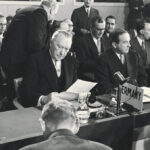
It’s the time of the year when we feature some of the smart conversations that occur around the country through the Eisenhower Series College Program. This episode features Christiana Crawford, Jody Daigle, and Amanda Raney as they examine the complex relationship between the United States and China. They joined podcast editor Ron Granieri to share their different yet complementary perspectives. Christiana emphasized the military’s goal is to build strength to preserve peace, Jody drew parallels to the Peloponnesian War by highlighting fear, honor, and interest as drivers of conflict, and Amanda discussed the inherent tension of competing with China while also collaborating with it in critical fields like medicine. The speakers agreed that this complex relationship, full of both cooperation and competition, must be carefully managed.
I have a much deeper understanding of that threat now after my studies here at the War College… I’ve wrestled with it and I’ve decided it’s not a tension that can be resolved. It has to be managed.
Podcast: Download
Subscribe: Apple Podcasts | Spotify | Amazon Music | Android | Pandora | iHeartRadio | Blubrry | Podchaser | Podcast Index | TuneIn | Deezer | Youtube Music | RSS | Subscribe to A Better Peace: The War Room Podcast
Christiana Crawford is a colonel, an operational planner and Western Europe Foreign area officer in the U.S. Marine Corps reserve. She was commissioned in 2004 from the U.S. Naval Academy. She recently served as the lead planner for Marine Corps Force modernization efforts in the Pacific. She is a graduate of the AY25 Resident Course and a member of the Eisenhower Series College Program at the U.S. Army War College.
Jody Daigle was commissioned from the U.S. Military Academy in 2002 and is a colonel that has served for 23 years in the U.S. Army Infantry and Special Forces roles, with several combat deployments to Iraq and the Southern Philippines. His Indo-Pacific focus includes military capacity building and diplomatic service at U.S. embassies in India, China, and the Philippines. He is a graduate of the AY25 Resident Course and a member of the Eisenhower Series College Program at the U.S. Army War College.
Amanda Ranney is a colonel and a medical operations planner in the Washington Army National Guard. She specializes in planning medical support for combat forces and leading medical units. Most recently, she commanded a multifunctional logistics battalion. In her civilian career, she manages clinical trials developing new cancer medicines. She is a graduate of the AY25 Resident Course and a member of the Eisenhower Series College Program at the U.S. Army War College.
Ron Granieri is Professor of History and the Chair of the Department of National Security and Strategy at the U.S. Army War College and the Editor of A BETTER PEACE.
The views expressed in this presentation are those of the speakers and do not necessarily reflect those of the U.S. Army War College, U.S. Army, or Department of Defense.
Photo Credit: Generated by Gemini





If we were to accept that the common “root cause” for the competition and conflict, between the governments of the U.S./the West and the rest of the world, that we have witnessed of late (to include the competition and conflict we have witnessed of late between even elements and groups here within the U.S./the West itself);
If we were accept that this such common “root cause” was worldwide resistance to the U.S./the West’s post-Cold War efforts, to transform the states and societies of the world (those both beyond and within the West); these, so that same might be made to better interact with, to better service and support and to better benefit from such things as capitalism, markets, globalization, the global economy, international trade and investment, etc.,
Then, given this such acceptance of this such “root cause” thesis, then could we then go on to say that there was — or was not — the ability to make a direct and positive Thucydides, and/or Peloponnesian War, comparison/relationship/parallel, etc.?
As a potential “China” example, of the worldwide “resistance” effort that I discuss above, consider the following:
“This may, in fact, be the missing explanatory element. Ideologies regularly define themselves against a perceived ‘other,’ and in this case there was quite plausibly a common and powerful ‘other’ that both (Chinese) cultural conservatism (Confucianism) and (Chinese) political leftism (Chinese socialism) defined themselves against. This also explains why leftists have, since the 1990s, become considerably more tolerant, even accepting, of cultural conservatism than they were for virtually the entire 20th century. The need to accumulate additional ideological resources to combat a perceived Western liberal ‘other’ is a powerful one, and it seems perfectly possible that this could have overridden whatever historical antagonism, or even substantive disagreement, existed between the two positions.”
(Items in parenthesis above are mine. See the 2015 Foreign Policy article “What it Means to Be ‘Liberal’ or ‘Conservative’ in China: Putting the Country’s Most Significant Political Divide in Context,” by Taisu Zhang.)
Question — Based on the Above:
If conflict and competition — throughout the world today and even within the states and societies themselves — if this can properly be seen through the lens of state and societies — and individuals and groups — today “girding their loins;” this, with various political, cultural and civilizational attributes; this, so as to combat a perceived Western liberal ‘other’ enemy, then (a) did something like this occur in Thucydides’ time and, thus, (b) can and should we refer to it now?
Based on the U.S./Western governments “threat” scenario, that I present in my first two comments above — and the worldwide resistance movement, that seems to have come about due to and in response to this such worldwide threat scenario — based on these such matters, might we say that:
a. In order for the U.S. to manage its relations with such nations as China (etc., etc., etc.) today,
b. This may require that U.S./Western governments abandon, or at least massively scale back and/or massively delay, their, threatening, such transformative agenda? (As to this such transformative agenda, again see the second paragraph of my first comment above.) This such “abandon,” and/or massively scale back and/or delay process, indeed, being undertaken, for example, by the Trump administration?
Likewise might we also say that — given this such worldwide/both at home and abroad “threat” scenario — and the worldwide/both at home and abroad negative response to same — might we also say that, indeed, this is one of the most clear-cut “honor, interest and fear” cases that we could possibly imagine and/or possibly wish to point to? (And, thus, indeed, a clear-cut relationship to Thucydides, etc.?)